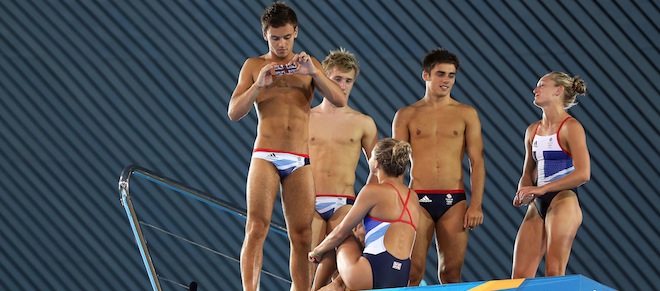@London2012 aka The Twit-lympics
Twitter turns athletes into public property—for better and often for worse
during a training session ahead of the London Olympic Games at the Aquatics Centre in Olympic Park on July 26, 2012 in London, England.
Share
Click here to read 9 ways Twitter has made new @London2012
Whether monkeys bashing at typewriters will produce the complete works of Shakespeare over an infinite period of time is a theorem best left to statisticians and philosophers. But given laptops, and a topic like the London 2012 Summer Games in Shakespeare’s England, can those monkeys generate an avalanche of mindless tweets? That is the question. The answer: yes, they already have.
Twitter is a defining characteristic of these Olympics: an Internet playground where the random synaptic firings of anyone with a pulse—athletes, coaches, Tory MPs and other primates—are expressed in 140 characters or less and posted for the world to see. It’s inclusive and democratic in theory, and occasionally mob rule in practice.
The International Olympic Committee (IOC), which used to limit message carrying to high-paying rights holders, has embraced social media as never before. Anyone can sign on to its Olympic Athletes’ Hub where, again in theory, they converse and trade snapshots on equal terms with such Olympians as Canada’s kayak king Adam van Koeverden and his 22,518 Twitter followers, or American basketball great LeBron James, with 17,546,113. (Even the twitterverse is competitive.)
It’s well and good, if a bit dull at times. “Walking the streets of London,” chronicles James, everyone’s new best friend. Then there’s Canada’s Émilie Heymans, who managed on July 31 in one tweet to both congratulate U.S. bronze medal diver David Boudia and note that he (like her) is an “@TeamVisa” sponsored athlete. After Heymans won her own synchronized diving bronze, she was still awake and tweeting at 4:32 a.m., too much adrenalin being the culprit, she wrote in French. Considering she had another event, maybe it was time to shut things down, non?
The trouble is things can, and do, go spectacularly off the rails here at the Twit-lympics. Witness the verbal assault on 18-year-old British diver Tom Daley after he and his synchro partner finished fourth. One of his million-plus followers waged war, telling Daley, “you let your dad down, i hope you know that.” That he had dedicated his performance to his father, who died last year of cancer, made it all the more malicious. Stung, Daley shared the message with his followers: “After giving it my all?.?.?.?you get idiots sending me this.” Drunk with attention, and cloaked in an illusion of anonymity, @Rileyy_69 escalated his semi-literate attack to threat: “i’m going to find you and i’m going to drown you in the pool you cocky twat your a nobody people like you make me sick.” Early the next morning, Dorset police arrested a 17-year-old on suspicion of malicious communications.
Twitter turns athletes into public property, for better and often for worse. Scottish comedian Frankie Boyle laid into British swimmer Rebecca Adlington, saying he worried she’ll have “an unfair advantage in the swimming by possessing a dolphin’s face.” Swiss Olympic soccer player Michel Morganella lashed out after losing to the South Koreans, calling them a “bunch of mongoloids.” The Swiss expelled Morganella, but the damage was done. Same story with Greek triple jumper Voula Papachristou. She was punted from her team for tweets endorsing a far-right party and mocking African immigrants.
Some of the Twits should know better. The Twitter account for Guy Adams, a journalist for London’s Independent, was suspended after he posted an NBC network executive’s email address. An enraged Adams wondered if his suspension is tied to Twitter’s commercial relationship with NBC. Well, duh!
Equally naive are a group of U.S. Olympians waging war against the IOC’s Rule 40. It forbids athletes from referencing their sponsors shortly before, and during, the Olympic Games—unless, like Heymans with Visa, their benefactors are among the IOC’s 11 premium sponsors. Price of admission: about $100 million each. “#Rule40 can kiss my temporarily tattooed butt,” tweeted U.S. middle-distance runner Nick Symmonds. There are 100 million reasons that won’t happen.
Coaches are of two minds about this virtual town as well. “I personally find it a bit of a distraction,” says Peter Cookson, high-performance director for Rowing Canada. Several rowers, he says, have sworn off social media for the duration. Canadian rowing coach Terry Paul sees its benefits. “The guys like to get back to the hotel, wheels up, and just chill out on their beds and look through Facebook. It draws them back to all their experiences leading to this point: all their coaches, their friends they row with at school, they’re wishing them well.”
Most of the Twitter traffic is indeed that: sweet, supportive missives. Monkey business arises when tweeters think their impressions are provocative, clever or unique. Too often, like British Tory MP Aiden Burley, who stepped in it by calling the opening ceremonies “lefty multicultural crap,” they are none of the above. They come off as a cry for attention, 140 characters at a time. Narcissism on the instalment plan.
